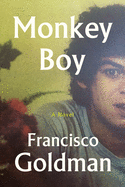
That the protagonist's name is Francisco Goldberg--an amalgam of maternal Guatemalan immigrant and paternal Jewish parentage--presents an irresistible invitation to explore autobiographical overlaps with award-winning creator Francisco Goldman. The parallels are immediate: both are peripatetic journalist/writers with connections to Boston, New York, Mexico City, Latin America. Beware of quick assumptions, however, because Monkey Boy's subtitle could easily be "I didn't know," a phrase repeated throughout, as Goldman's not-quite-doppelgänger narrates a New York-to-Boston trip that leaves him poignantly changed, perhaps even newly enlightened.
On a Thursday in March, Frankie (his childhood name, to which he reverts for the days ahead) boards a morning train for a scheduled radio interview (he's famous), followed by dinner with a woman with whom he briefly shared 10th-grade kisses. The journey, marked by the arrivals and departures along the Northeast Corridor, is not unlike Frankie's fits-and-start-reveals of his own life as readers piece together details of his dysfunctional family, his bullied childhood (when he was "Monkey Boy" and worse), his work, his affairs. From his arrival at South Station through 3:43 a.m. Monday morning, Goldberg's multiple interactions--all with women--will reveal new truths both past and current about his own birth, his abusive father, his deteriorating mother, his estranged sister, their erased ancestry, his mother's nonagenarian portrait painter.
Goldman's ability to intricately alchemize real life and fiction won him considerable praise for Say Her Name. That convincing intimacy illuminates Monkey Boy, which, despite exposing historical, generational, familial denial and horror, ultimately proves to be a beguiling, surprisingly droll portrait of an unsettled middle-aged man (still) searching for love and (self-)acceptance. --Terry Hong, Smithsonian BookDragon

